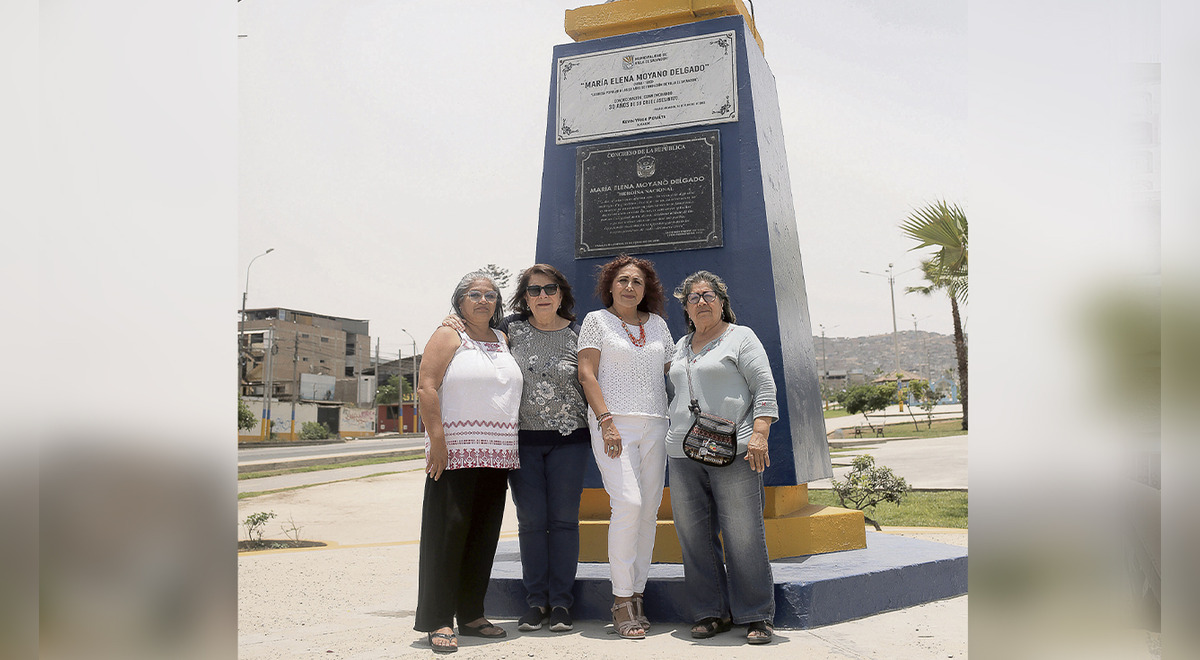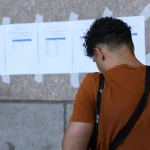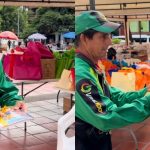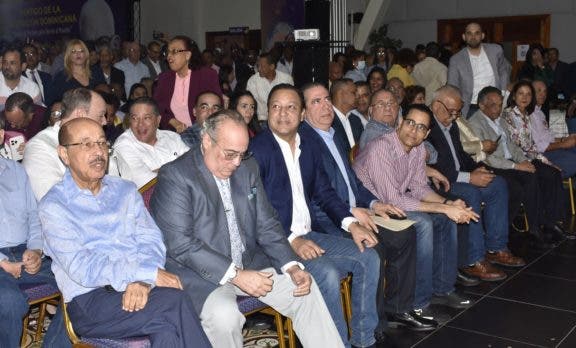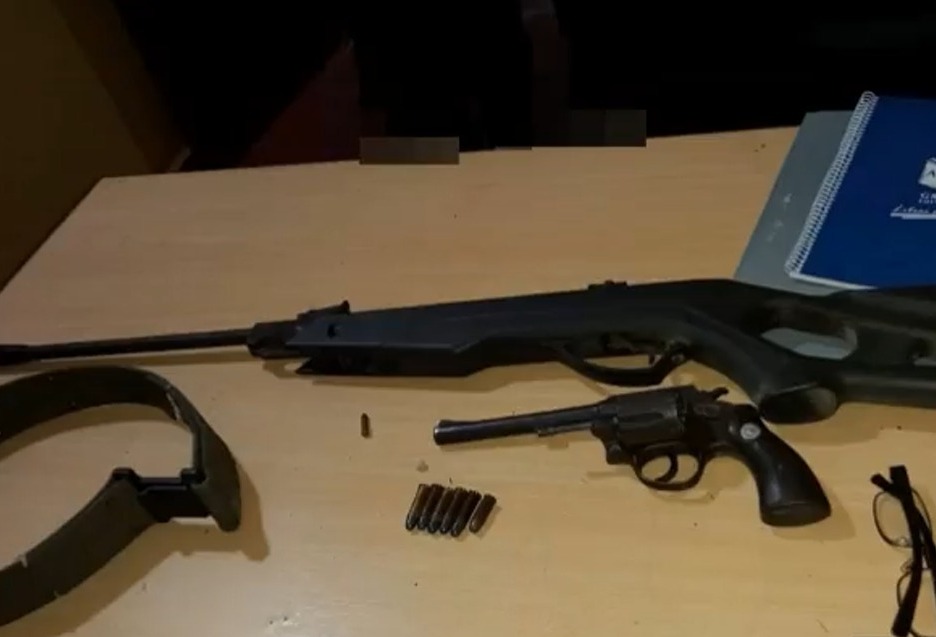Always present. 31 years after the assassination of the legendary leader of Villa El Salvador, six friends gather to remember her. They highlight her courage in confronting Sendero Luminoso’s terrorism, her extraordinary organizational capacity, and her constant efforts to make Peru a better country.
Six friends of the leader of Villa El Salvador, María Elena Moyano, met again at the Casa de la Mujer in that district, where she spent much of her life as a leader. They recalled her tireless work to reduce the impact of poverty, her great convening power, her defense for life and equal rights. Her legacy lives on in each one of them, as well as in all those who knew her, despite the 31 years that have elapsed since she was assassinated by Sendero Luminoso.
“La Negrita always brings us together,” commented Berta Jáuregui, smiling, who headed the Vaso de Leche committee in her sector when she met her. María Elena Moyano was then leading the Popular Federation of Women of Villa El Salvador (FEPOMUVES). Both were part of the first generation of women who raised their voices to demand their rights.
“This table is historic because, just as we celebrate, we agree on fights, we also discuss, debate current issues that affect women,” she said, caressing the piece of furniture nostalgically.
He remarked that the leader of Villa El Salvador always said that the federation was born with the purpose of revaluing the work of women, making them aware of their rights and preparing them to assume more and more positions of responsibility.
“Many women did not decide to accept a leadership role for fear of not knowing how to develop, but workshops were held here so they could learn to perform. This is how many of us got involved in the work of the organization, to from there contribute to the development of the district”, she highlighted.
She emphasized that she, with the support of non-governmental organizations, promoted the training of women to guide and accompany victims of family violence, thus giving rise to legal counselors, who still exist up to now. And on the subject of health, she promoted the operation of an office on the second floor of the building where they meet to remember her.
“We always say, if María Elena had not died, where would she be now. She would be president of Peru, ”she said with complete confidence.
I learned from her
Rocío Paz lived with her in the political leadership. Both were active in the Mariateguista Unified Party. She was responsible for the youth and María Elena Moyano for the women. In addition, both knew their respective families because they were neighbors of Villa El Salvador.
“She kind of adopted me… When I intervened, she told me ‘you have to be more sure, you have to say things with more force.’ I admired her. Every time I spoke at the assemblies, I learned from her,” he recounted.
He stressed that, from a very young age, María Elena Moyano had the gift of connecting with everyone, with the neighbors, in the party, with social organizations, with public institutions, with international cooperation, with everyone who could help in the construction of a better community in Villa.
She dreamed of a better country, without hunger, without violence, where women have the same opportunity as men.
“We were saying, there will be an opportunity to build a better country, but we have to be organized, each one on their own is not going to do it,” he said.
He defended participatory democracy
Esther Moreno shared with María Elena Moyano in the 1980s, when the mayor of Lima, Alfonso Barrantes, created the Glass of Milk Program. He went to Villa El Salvador to exchange experiences, since they were beginning to form organizations in the streets of the Independencia district.
“We shared some experiences of struggle, such as this great mobilization that was generated to confront the APRA government that only recognized the mothers’ clubs that they led, marginalizing the self-managed soup kitchens encouraged by the Church, the left, or independent people,” he said.
He also stressed that he not only had a vision for the local space, but for the country and defended participatory democracy. “She developed what she said in her speech: that the revolution is not fanaticism, it is not death, the revolution is life in dignity. With the group of women, she builds what we now call citizen power”, she maintained.
leader-ruler
The former mayor of Villa El Salvador, Michel Azcueta, was linked to María Elena Moyano and her family in the 1970s. He shared with her in different facets, becoming her deputy mayoress, a position she held when she was assassinated.
“She knew how to grow as a woman, as a leader, as a ruler, and always at the service of Villa El Salvador, especially women,” she said.
He stressed that she was always very brave to defend her principles before everyone, but she was also a great leader-ruler.
“Leader in the sense of being linked to an organization and directing it; and governing in the sense of using resources and providing solutions. María Elena was extraordinary in both aspects,” he commented.
He stated that, following this line, the leader promoted the creation of FEPOMUVES, which at the time became the largest in Latin America; and at the same time, she promoted solutions to problems such as hunger with the creation of collection centers, and as deputy mayoress, she organized the popular inspectors who were volunteers to control the correct price and weight in warehouses and markets, thinking of the poorest.
“Her leadership aspect together with the other women served to solve the problems,” she said.
great articulator
Diana Miloslavich met María Elena Moyano in 1985 and shared many moments with her as a friend, leader and authority.
“She was one of the leaders who knew how to articulate. She did it with the people in Villa, the sectors, the collection centers, the glasses of milk, the mothers’ clubs. She was a militant in her party, in FEPOMUVES, and an articulator with the world, outside of Villa, ”she stressed.
He recalled that he believed and acted with full democracy, listening to the leaders and the people.
“To run as deputy mayor of Villa El Salvador, María Elena consults FEPOMUVES, and they give her their support. She then introduces herself with the endorsement of her base, which others don’t do,” she revealed.
She stressed that she was building her life, and in the process she established relationships in Lima and abroad, but not for herself, but for Villa El Salvador and the women.
“He had the quality of listening to people, everyone, without making a difference,” he said.
work in community
Olenka Ochoa established a friendship with María Elena Moyano at the end of the 80s, when she went to look for her in Villa El Salvador as a university student. By then, he was already a legend and she didn’t imagine it would be so easy to talk to her.
“I arrived at the Municipality and introduced myself, and from there she adopted me… From her I learned what it was like to work for the community, but above all, how to be an authority with ties and coherence,” she said.
They traveled all over Villa to talk to the people, to see their problems and seek solutions through self-management, in the same way that the district was formed. “She had one leg in the municipality and another in the community… you gave her an idea or she saw something, and she said: ‘we have to do that here,’” she recounted.
He stressed that he treated everyone with respect, be it the most famous person or a grassroots person; always seeking peace, tied to social justice and participatory democracy.
This was María Elena Moyano, and her legacy is still present.
SL tried to discredit her to justify himself
To justify the murder of María Elena Moyano, Sendero Luminoso tried to discredit her. Berta Jáuregui was a leader with her, and she explains that none of that is true.
“They said that he had a cheese factory with stolen milk, but it was a project in which the women of the Glass of Milk went to work on the condition that they sell the cheeses to the kitchens at low prices and with a week of credit so that could pay for them,” he clarifies.
She points out that another lie was that she owned a grain factory. It was a project of Peru Mujer, for the neighbors who needed to work.
reactions
Berta Jáuregui, neighborhood leader
“She worked with coordinators of the Glass of Milk program from different political positions, but united by the objective that it be for children up to thirteen years old, pregnant mothers and tebecianos.”
Rocío Paz, party partner
“She was always talking about a better country, about better conditions for girls, about how to get women to participate more, that they have more strength. You don’t just have to be in the assembly. We have to talk”.
Esther Moreno, leftist leader
“We must recognize in her her great sensitivity, solidarity and humanity… María Elena was strength, courage, democratic organization, construction of citizen power. All of that was her.”
Michael Azcueta, former VES mayor
“The murder of María Elena was the beginning of the end for Sendero Luminoso. Such was the repudiation, national and international, that Sendero could not justify her death despite having tried to discredit her”.
Diana Miloslavich, friend
“She faced the terrorism of Sendero Luminoso with the people. She raised the urban rounds, the district committees for peace against terrorism. She was the most lucid on the left in Peru ”.
Olenka Ochoa, friend
“María Elena’s role in her time was to be a mediator. With all the people like me, who came to meet her, she generated a kind of bond, which is never broken, which is forever”.
